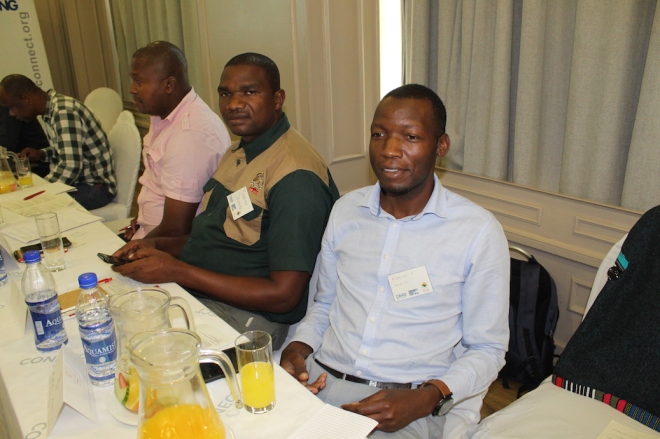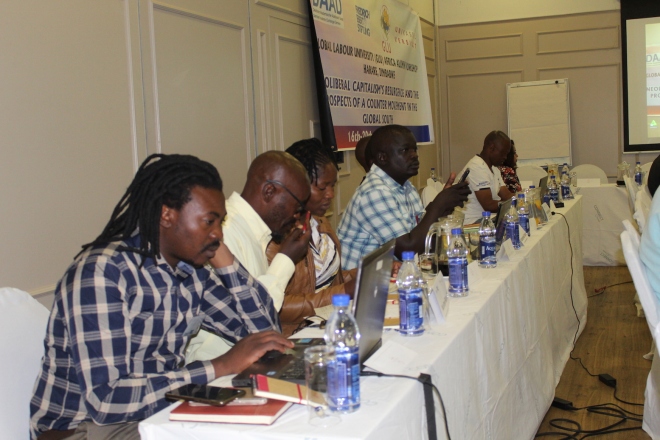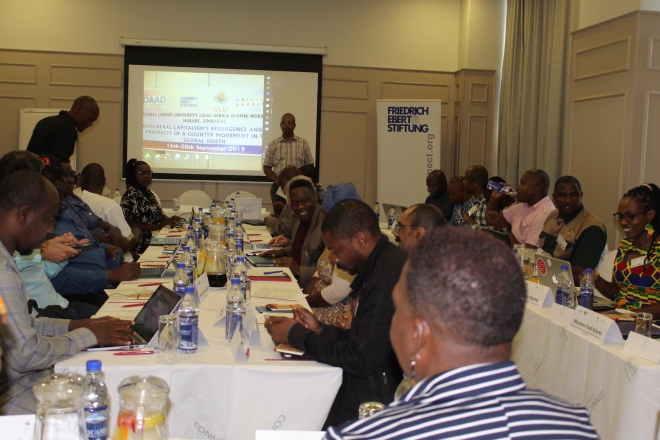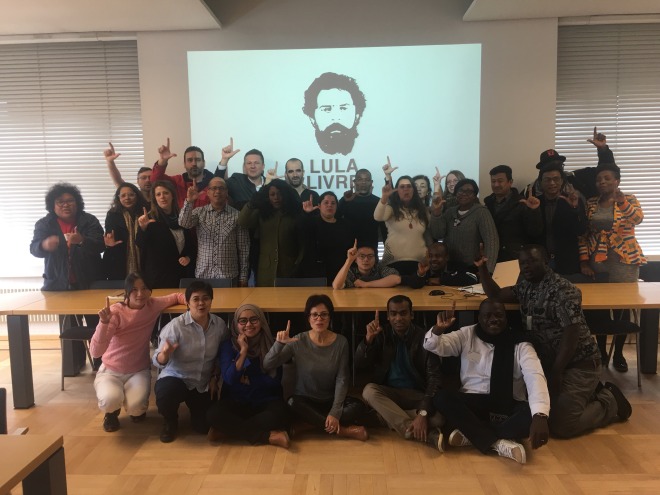Day 5 – Friday 20th September 2019
Contributor: Taurai Mereki
Editing: Maurine Chadi Kalume
The fifth and last day of the workshop was devoted to the alumni themselves. In the first session of the morning, three alumni made presentations highlighting on precarity as a condition of life and base of collective politics grounded on country studies. The rest of the day was devoted to the alumni meeting and strengthening of the ‘loose’ GLU Africa Alumni Network.
 This panel discussion titled ‘Resistance in the face of precarious work and life: The African experience –precarity as a condition of life and base of collective politics’ was an all alumni panel chaired by Iipumbu Sakaria from the National Planning Commission of Namibia and the panelist were Mpho Shadreck Maruping from Directorate of Public Service Management of Botswana, Maureen Kalume – Kenya Union of Domestic Hotels, Educational Institution, Hospitals and Allied Workers (KUDHEIHA) and Dr. Janet Munakamwe from University of the Witwatersrand and Zimbabwe Institute for socio-Economic and Labour Research (ZISELaR).
This panel discussion titled ‘Resistance in the face of precarious work and life: The African experience –precarity as a condition of life and base of collective politics’ was an all alumni panel chaired by Iipumbu Sakaria from the National Planning Commission of Namibia and the panelist were Mpho Shadreck Maruping from Directorate of Public Service Management of Botswana, Maureen Kalume – Kenya Union of Domestic Hotels, Educational Institution, Hospitals and Allied Workers (KUDHEIHA) and Dr. Janet Munakamwe from University of the Witwatersrand and Zimbabwe Institute for socio-Economic and Labour Research (ZISELaR).

 Volunteer tour guides, Gift Maoneka, Fungai Munetsi and Nunurayi Mutyada took turns to explain how the informal traders were formerly allocated trading sites by the city council in the CBD before being violently removed by the municipal police through an operation called “Restore Order.” The sight of informal traders using makeshift shelters and sharing a single toilet clearly shows that the allocated place is not suitable for trading. The site is shared by over 500 traders and is highly politicised. Traders align themselves to the ruling political party ZANU PF in order to secure their trading places. Traders pay rentals to both the city council and to the political party structure at the site.
Volunteer tour guides, Gift Maoneka, Fungai Munetsi and Nunurayi Mutyada took turns to explain how the informal traders were formerly allocated trading sites by the city council in the CBD before being violently removed by the municipal police through an operation called “Restore Order.” The sight of informal traders using makeshift shelters and sharing a single toilet clearly shows that the allocated place is not suitable for trading. The site is shared by over 500 traders and is highly politicised. Traders align themselves to the ruling political party ZANU PF in order to secure their trading places. Traders pay rentals to both the city council and to the political party structure at the site. The first session was a skype conference on GLU Online Academy: MOOCs and tutoring by Dr. Edlira Xhafa and was facilitated by Prof Praveen Jha of Jawaharlal Nehru University (JNU). The session generated a lot of interest from the audience and it proved to be a huge success. Some of the key points raised on MOOCs were;
The first session was a skype conference on GLU Online Academy: MOOCs and tutoring by Dr. Edlira Xhafa and was facilitated by Prof Praveen Jha of Jawaharlal Nehru University (JNU). The session generated a lot of interest from the audience and it proved to be a huge success. Some of the key points raised on MOOCs were;  The first session was a panel discussion on ‘Africa and the future of work – Reflections on the future of work in the sharing economy’ chaired by Daniel Oberko – Public Services International and the speakers were Edwin Anisha – Michael Imoudu National Institute for Labour Studies, Babatunde Aiyelabola – Public Services International (PSI), and Prof. Praveen Jha – Jawaharlal Nehru University (JNU). The main highlights of the presentations were that the pattern of employment has moved from employment rights to flexibility over the past three to four decades. They further highlighted that employment is now constrained with no dependable job security, career mobility/growth or training and employer’s good will. Jobs are now non-permanent, done in irregular places and sites with no clear or direct employer, thus the future of work might actually be the future of no work. Capital in the north is also partnering with capital in the south thus posing challenges for the working class. It was also highlighted that cellphone parts are produced in 8 countries and assembled in one country. Therefore capital mobility has implication on nature of work. Other major highlights were as follows;
The first session was a panel discussion on ‘Africa and the future of work – Reflections on the future of work in the sharing economy’ chaired by Daniel Oberko – Public Services International and the speakers were Edwin Anisha – Michael Imoudu National Institute for Labour Studies, Babatunde Aiyelabola – Public Services International (PSI), and Prof. Praveen Jha – Jawaharlal Nehru University (JNU). The main highlights of the presentations were that the pattern of employment has moved from employment rights to flexibility over the past three to four decades. They further highlighted that employment is now constrained with no dependable job security, career mobility/growth or training and employer’s good will. Jobs are now non-permanent, done in irregular places and sites with no clear or direct employer, thus the future of work might actually be the future of no work. Capital in the north is also partnering with capital in the south thus posing challenges for the working class. It was also highlighted that cellphone parts are produced in 8 countries and assembled in one country. Therefore capital mobility has implication on nature of work. Other major highlights were as follows;  Being one of its kind; the conference brought together 38 participants from all over Africa to discuss thematic issues affecting the labor movement in the Global south. It drew strength from the already existing network created by the Global Labour University programs to develop a think tank for labor in Africa. The workshop also served as a platform for sharing best practices across the region in opposition to capital. Thus, the workshop was structured in sessions where the panellists delivered presentations on the topics for the day which led to open forums and discussions.
Being one of its kind; the conference brought together 38 participants from all over Africa to discuss thematic issues affecting the labor movement in the Global south. It drew strength from the already existing network created by the Global Labour University programs to develop a think tank for labor in Africa. The workshop also served as a platform for sharing best practices across the region in opposition to capital. Thus, the workshop was structured in sessions where the panellists delivered presentations on the topics for the day which led to open forums and discussions.